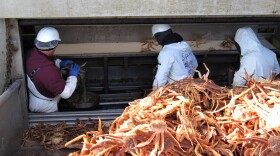While construction is still years away, a proposal to streamline shipping traffic through the Port of Dutch Harbor has cleared several early hurdles.
In 2018, the U.S. Army Corps of Engineers finished a two-year feasibility study, recommended a dredging project, and won initial approval from the Unalaska City Council.
The Corps is looking to blast out and scoop away a bar that hampers navigation into Iliuliuk Bay.
By removing the dense 16-foot shoal, project planner George Kalli said deep-draft vessels would be able to maneuver through the entrance channel more easily at a comfortable depth of 58 feet.
"The bar is really the only constraint out there," he said. "It's surrounded by deep water on both sides."
With better access to that deep water, Kalli said container vessels and other large ships wouldn't have to take such costly, time-consuming measures to make it over the bar and into port.
Currently, many vessels reduce their drafts by taking light loads, discharging ballast water, and skipping refueling stops.
"Our proposed project won't result in deeper-draft vessels coming in," he said. "It's just going to result in a more efficient use of those vessels. More efficient commerce with the existing fleet."
Unalaska's ports director, Peggy McLaughlin, said it would also improve safety.
In bad weather, vessels wouldn't have to wait outside the port before attempting to cross the bar in calmer conditions. They wouldn't have to transfer fuel in open water, either.
"There's a tremendous amount of lightering for fuel tankers that happens outside of port," said McLaughlin. "We've been very fortunate in that the companies doing that are very responsible, but there are risks associated with it. So there's some risk reduction and mitigation if the channel opens up."

Before making its recommendation to dredge, the Corps mapped the seafloor's topography, conducted marine mammal surveys, and modeled the effects of wave and wind patterns.
The feasibility study found no evidence that the project would necessitate frequent maintenance dredging, increase erosion on Front Beach, or require a lengthy environmental impact statement.
Instead, Kalli said planners expects to need a simpler environmental assessment, along with permits from the National Marine Fisheries Service and U.S. Fish and Wildlife Service. Those permits would allow for the use of blasting explosives, which are likely to disturb marine mammals.
Kalli and McLaughlin said the Corps would work out further details during the formal design process — if the agency's headquarters signs off on the estimated $29 million project.
Next week, planners are scheduled to present the feasibility study to high-level Corps officials, who will review it and decide whether to endrose the project by spring. If they do, they're expecteced to make a funding recommendation to Congress by August of 2019.
Should the project go forward, the City of Unalaska would be responsible for about half of the total cost. The City Council passed a resolution unanimously last week in support of the Corps' dredging proposal.
Construction would be completed in 2022 at the earliest.






